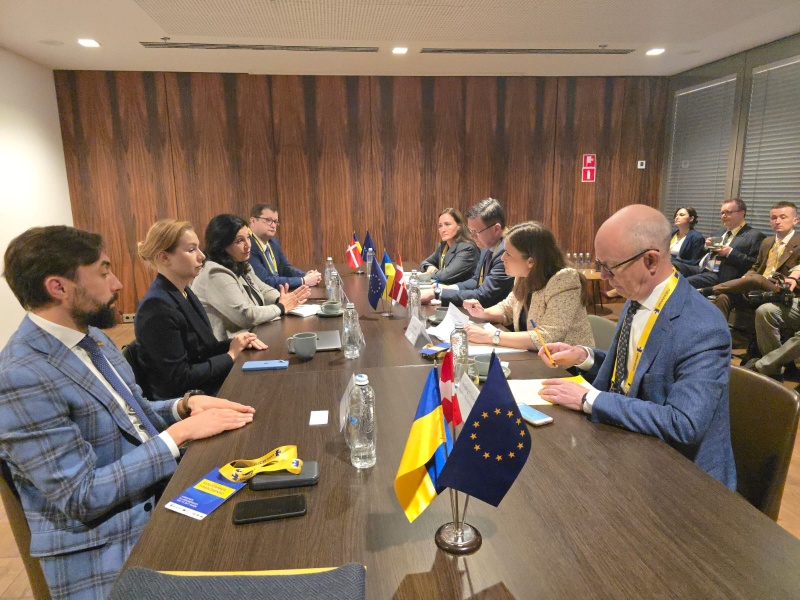
The Chair of the Committee on Ukraine’s Integration into the EU, Ivanna Klympush-Tsintsadze, met with the Minister for European Affairs of Denmark, Marie Bjerre.
Ivanna Klympush-Tsintsadze thanked Marie Bjerre for her visit to Ukraine and for meeting with representatives of different political forces. According to the Chair of the Committee, various political forces in Ukraine actively support European integration. For Ukrainian society, the movement towards the EU, according to Ivanna Klympush-Tsintsadze, is a light at the end of the tunnel and an important emotional support during the difficult struggle for independence and statehood. The Chairwoman of the Committee on Ukraine’s Integration into the EU thanked Denmark for its systematic support of Ukraine's defence, in particular for Denmark's leadership in attracting investments in the Ukrainian defence industry. Ivanna Klympush-Tsintsadze also stressed the importance of Denmark's support for Ukraine's anti-corruption policy. Marie Bjerre emphasised that the success of anti-corruption efforts in Ukraine is crucial for Denmark. According to her, the Danes do not tolerate corruption; they are "allergic" to it. It is fundamentally important that, on the way to the EU, Ukraine undergoes transformation aimed at combating corrupt practices.
The Chair of the Committee on Ukraine's Integration into the EU emphasised that integration into the European Union should be a kind of magnifying glass, under which EU partners should see the transformations and problem areas that need to be improved in Ukraine. Ivanna Klympush-Tsintsadze believes that some of the restrictions on public and political life imposed under martial law are disproportionate. “These restrictions very often apply to dissenting voices. The European Commission’s report on enlargement stated that Ukraine should restore pluralism in the media even during martial law. I am convinced that this is important for all of us to preserve democracy, for which we are all fighting together. It is equally important to restore political pluralism and the decentralisation reform, which has regressed in recent years. Therefore, we need to work on these things, especially when we are preparing to open the “Fundamentals” cluster. We must take all these steps… to be a capable, strong member of the European Union, a member that is respected,” stated the Head of the Committee on Ukraine’s Integration into the EU.
The parties also discussed challenges, such as Hungary’s blocking of Ukraine’s movement to the European Union. Ivanna Klympush-Tsintsadze is convinced that it would be difficult to resolve the issue with Hungary at the bilateral level. Therefore, it is the European side that should work with Budapest so that Ukraine does not become a hostage to Hungary’s political manipulations.
Ivanna Klympush-Tsintsadze thanked Marie Bjerre for her visit to Ukraine and for meeting with representatives of different political forces. According to the Chair of the Committee, various political forces in Ukraine actively support European integration. For Ukrainian society, the movement towards the EU, according to Ivanna Klympush-Tsintsadze, is a light at the end of the tunnel and an important emotional support during the difficult struggle for independence and statehood. The Chairwoman of the Committee on Ukraine’s Integration into the EU thanked Denmark for its systematic support of Ukraine's defence, in particular for Denmark's leadership in attracting investments in the Ukrainian defence industry. Ivanna Klympush-Tsintsadze also stressed the importance of Denmark's support for Ukraine's anti-corruption policy. Marie Bjerre emphasised that the success of anti-corruption efforts in Ukraine is crucial for Denmark. According to her, the Danes do not tolerate corruption; they are "allergic" to it. It is fundamentally important that, on the way to the EU, Ukraine undergoes transformation aimed at combating corrupt practices.
The Chair of the Committee on Ukraine's Integration into the EU emphasised that integration into the European Union should be a kind of magnifying glass, under which EU partners should see the transformations and problem areas that need to be improved in Ukraine. Ivanna Klympush-Tsintsadze believes that some of the restrictions on public and political life imposed under martial law are disproportionate. “These restrictions very often apply to dissenting voices. The European Commission’s report on enlargement stated that Ukraine should restore pluralism in the media even during martial law. I am convinced that this is important for all of us to preserve democracy, for which we are all fighting together. It is equally important to restore political pluralism and the decentralisation reform, which has regressed in recent years. Therefore, we need to work on these things, especially when we are preparing to open the “Fundamentals” cluster. We must take all these steps… to be a capable, strong member of the European Union, a member that is respected,” stated the Head of the Committee on Ukraine’s Integration into the EU.
The parties also discussed challenges, such as Hungary’s blocking of Ukraine’s movement to the European Union. Ivanna Klympush-Tsintsadze is convinced that it would be difficult to resolve the issue with Hungary at the bilateral level. Therefore, it is the European side that should work with Budapest so that Ukraine does not become a hostage to Hungary’s political manipulations.
More posts by topic
“News”
29 January 2026 15:00
22 January 2026 14:30
20 January 2026 13:00
18 December 2025 10:11
15 December 2025 10:07
12 December 2025 10:04
10 December 2025 10:01
04 December 2025 10:09
02 December 2025 09:58
24 November 2025 13:08